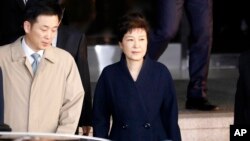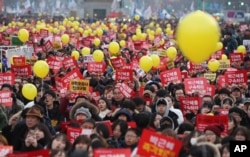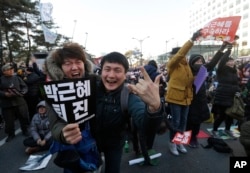Prosecutors in South Korea Monday requested an arrest warrant for impeached former President Park Geun-hye on charges related to the alleged multimillion-dollar bribery scandal that forced her from office.
Park was ousted from office for allegedly colluding with her longtime friend Choi Soon-sil to extort Korean conglomerates to donate over $69 million to two dubious foundations. Choi was alleged to have a “cult-like” influence over President Park and access to classified documents, even though she had no official government role.
The prosecution team within the Ministry of Justice, which has been investigating the presidential scandal, released a statement announcing the arrest warrant request for Park.
“The case is very grave as the suspect has showed actions of abuse of power, such as collecting bribes from companies using the president's position of power and authority, and infringed upon the freedom of management of companies, and leaked important official secrets,” the statement said.
The Seoul Central District Court has said it will rule Thursday on whether to grant an arrest warrant later this week.
Park was immune from any criminal prosecution while in office. Prior to being forced from office, she refused to cooperate with an independent counsel investigation and declined to speak in her own defense during a Constitution Court trial that ultimately upheld the National Assembly impeachment vote.
A new presidential election is scheduled for May 9.
In its ruling, the court noted the impeachment trial was focused, not on Park’s criminal guilt or innocence, but on the legitimacy of the National Assembly action to oust the president.
The justices also admonished Park and her defense team for being uncooperative and evasive in the investigations and attempting to prevent the legislature from acting as a “check and balance” on executive power.
Rule of law
As a private citizen facing a possible criminal indictment, Park will now be afforded all the protections under the law, including a presumption of innocence that did not apply to the impeachment process, and will require the prosecution to present substantial proof to support its charges.
The former president apologized on a number of occasions for any possible misconduct by those around her, but has denied that she was personally involved in any wrongdoings.
After the court upheld the impeachment, Park agreed to cooperate with the criminal investigation, and last week was interrogated by prosecutors for 14 hours.
Prosecutors also expressed concern in their Monday statement that Park may have destroyed evidence.
Prosecutors had tried to raid the presidential Blue House while Park was still living there, but were denied entry due to the president’s immunity protection and because officials claimed the presidential office is a national security facility.
The prosecution is expected to directly tie Park to the case against Samsung Group vice chairman Lee Jae-yong. Lee and other company officials were indicted for donating $37.19 million to the Choi run foundations in exchange for government help on an important merger for the company. They face up to 20 years in prison if convicted.
Choi and a number of presidential aides are facing similar charges and prison terms for their roles in the influence peddling scandal. Choi also denies she committed any any wrongdoing.
Mixed reaction
The main opposition Democratic Party of Korea released a statement Monday calling the arrest warrant request, a “historic decision.”
“Arrest of this suspect is unavoidable and obvious. We think the prosecution fully considered and made a (just) decision,” the Democratic Party statement said.
The Democratic Party also reprimanded Park for not publicly accepting the impeachment ruling as legitimate and for not urging her supporters to abide by the decision of the courts.
Park’s conservative political party, the Liberty Korea Party, sounded resigned to her likely indictment in a short statement released Monday.
“We understand that the prosecution made the decision according to law and principle, but it is regrettable as we would like that investigation (to continue) without (Park’s possible) detention,” said the Liberty Party statement.
While Park is the first democratically elected president of South Korea to be impeached, she will not be the first to be indicted, if the court approves the prosecution’s arrest warrant request.
Former President Roh Moo-hyun successfully fought off an impeachment motion, but after leaving office he was charged with bribery and tax evasion over allegations he and other family members had taken million of dollars from a wealthy shoe manufacturer.
Reportedly distraught over the corruption scandal, Roh later committed suicide.







